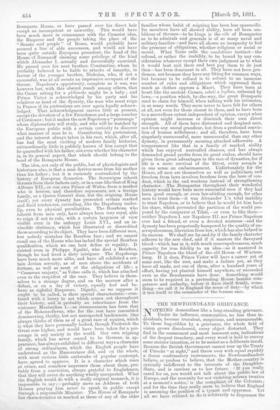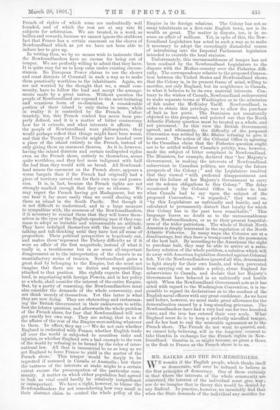THE NEWFOUNDLAND GRIEVANCE.
NOTHING demoralises like a long-standing grievance. its ts influence, communities, no less than in- dividuals, become truculent, suspicious, and unreasonable. To those hag-ridden by a grievance, the whole field of vision grows discoloured, every object distorted. They find. in the commonest and most innocent acts, indications of the deepest treachery, and every word. is held to convey some sinister intention, or to be meant as a deliberate insult. Because the British Government cannot tear up the Treaty of Utrecht "at sight," and throw over with equal rapidity a dozen confirmatory instruments, the Newfoundlanders i believe, or profess to believe, that the Mother-country is cynically indifferent to the interests of the Daughter- State, and is careless as to. her future. ' If you really cared for us, you would not talk about the public law of Europe, and the necessity for not violating solemn treaties at a moment's notice,' is the. complaint of the Colonists ; and for the time they really seem to believe that England is assuming the position of a tyrant and oppressor. Yet all we have refused to do is arbitrarily to dispossess the French of rights of which some are undoubtedly well founded, and of which the rest are at any rate fit subjects for arbitration. We are treated, in a word, as bullies and cowards, because we cannot ignore the stubborn fact that France has a certain easement on the shores of Newfoundland which as yet we have not been able to induce her to give up. In writing thus, we by no means wish to insinuate that the Newfoundlanders have no excuse for being out of temper. We are perfectly willing to admit that they have. It is quite easy for us to keep calm under existing circum- stances. No European Power claims to use the shores and coast districts of Cornwall in such a way as to make them practically worthless to the inhabitants. Again, we are not worried by the thought that we, a small com- munity, have to follow the lead and accept the arrange- ments made by a great nation. Without question the people of Newfoundland are exposed to the most irritating and vexatious form of co-dominion. A considerable portion of their island is only theirs in name, while in reality it is controlled by the French. Unfor- tunately, too, this French control has never been pro- perly defined, and it is a matter of bitter controversy how far it extends, and what interests it affects. If the people of Newfoundland were philosophers, they would perhaps reflect that things might have been worse, and that the Treaty of Utrecht might have handed over a piece of the island entirely to the French, instead of only giving them an easement thereon. As it is, however, having the inland districts and certain undisputed rights even on the French shore, entirely to themselves, seems quite worthless, and they feel more indignant with half the loaf than they would with no bread. All Newfound- land minus the easement on the French shore, appears a worse bargain than if the French had originally had a piece of territory carved out for their own use and posses- sion. It is, in. fact, because the French rights are not strongly marked enough that they are so irksome. We may regret the French having got Madagascar, but we can bear it far more easily than we could sharing with them an island in the South Pacific. But though it is not difficult to understand, and in a large measure to sympathise with, the soreness of the Newfoundlanders, it is necessary to remind them that they will lower them- selves in the eyes of the English-speaking race if they con- tinue to adopt so irritable and unreasonable an attitude. They have indulged themselves with the luxury of tall- talking and tall-thinking until they have lost all sense of proportion. Their political perspective is hopelessly out, and makes them•represent the Fishery difficulty as if it were an affair of the first magnitude, instead of what it really is, a troublesome but in no sense all-important disagreement as to the interpretation of the clauses in an unsatisfactory series of treaties. Newfoundland gains a great deal by belonging to the Empire, but she must not imagine that there are no duties and responsibilities attached to that position. She rightly expects that Eng- land, in negotiating with foreign Powers, and in her policy as a whole, shall consider the interest of the entire Empire. But, by a parity of reasoning, the Newfoundlanders must also consider the demands of the whole community, and not think merely of themselves. Yet this latter is what they are now doing. They are obstructing and embarrass- ing the British Government in their endeavours to settle, first the lobster question, and afterwards the whole problem of the French shore, for fear that Newfoundland will not get exactly her own way. They are acting, that is, as if the affairs of the rest of the Empire were nothing whatever to them. In effect, they say We do not care whether i England is embroiled with France, whether English trade all over the world is subjected to countless risks and iujuries, or whether England sets a bad example to the rest of the world by refusing to be bound by the rules of inter- national law. All that is immaterial to us as long as we get England to force France to yield in the matter of the French shore.' This temper would be deeply to be i regretted if assumed in Canada or Australia ; but there the vastness of the interests at stake might to a certain extent excuse the preoccupation of the particular com- munity. A matter on which either population had agreed to look as vital could hardly. be relatively insignificant or unimportant. We have a right, however, to blame the Newfoundlanders for not remembering how very small is their abstract claim- to control the whole policy of the Empire in its foreign relations. The Colony has not as many inhabitants as a first-rate English town, nor is its wealth as great. The matter in dispute, too, is in no sense an affair of millions. Yet, in spite of this, the New- foundland Legislature has acted in such a way as to make it necessary to adopt the exceedingly distasteful course of introducing into the Imperial Parliament legislation intended to override the local statutes.
Unfortunately, this unreasonableness of temper has not been confined by the Newfoundland Legislature to the dispute with the Mother-country over the Fisheries diffi- culty. The correspondence relative to the proposed Conven- tion between the United States and Newfoundland shows that the Colony is, in its present frame of mind, willing to sacrifice, not only England, but its neighbours in Canada, to what it believes to be its own material interests. Con- trary to the wishes of Canada, Newfoundland endeavoured to make separate terms at Washington as to the admission of fish under the McKinley Tariff. Newfoundland, in order to obtain this privilege, was to allow the purchase of bait in her ports. The Dominion not unnaturally objected to this proposal, and pointed out that the North Atlantic Fishery question must be treated as a whole, and not piecemeal. In this view the British Government agreed, and ultimately, the difficulty of the proposed Convention was settled by Mr. Blaine refusing to give it his assent. The action of the Colonial Office in agreeing to the Canadian claim that the Fisheries question ought not to be settled without Canada's privity, was, however, made the subject of bitter complaint in Newfoundland. The Ministers, for example, declared that " her Majesty's Government, in making the interests of Newfoundland subservient to Canadian politics, are ruining the future prospects of the Colony ; " and the Legislature resolved that they viewed " with profound disappointment and alarm the failure of her Majesty's Government to carry out its solemn obligations to this Colony." The delay occasioned by the Colonial Office in order to hear what Canada had to say upon the subject of the proposed Convention, " is regarded," they went on, " by this Legislature as unfriendly and hostile, and as calculated to permanently disturb that loyalty for which this Colony has in the past been remarkable." This language leaves no doubt as to the unreasonableness of the Newfoundlanders, or as to their present forgetful- ness of the wider patriotism. The whole of British North America is deeply interested in the regulation of the North Atlantic Fisheries. In many ways the Colonies are at ,a disadvantage, but they have a trump-card in the possession of the best bait. By according to the Americans the right to purchase bait, they may be able to arrive at a satis- factory solution of the whole problem, a solution which will do away with American legislation directed against Colonial fish. Yet the Newfoundlanders ignored all this, determined to fight simply for their own hands, and when prevented from carrying out so unfair a policy, abuse England for subservience to Canada, and declare that her Majesty's Government have behaved in an unfriendly and hostile spirit. When the Newfoundland Government acts as it has acted with regard to the Washington Convention, it is im- possible to regard its declarations as to the conduct of the English naval officers with any great confidence. As we have said before, however, we must make great allowance for the demoralisation caused by a long-standing grievance. The Newfoundlanders have had a very bad one for two hundred years; and the iron has entered their very souls. What England must do is to keep a perfectly unruffled temper, and do her best to end the miserable agreement as to the French shore. The French do not want to quarrel, and, we cannot help believing, will in the long-run consent to take Gambia in exchange for the French rights in New- foundland. Gambia is, or might become, as great a thorn in the flesh to France as the French shore is to us.



































 Previous page
Previous page